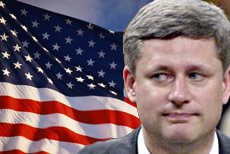
London Review of Books has an excellent critique of Fukuyamas newest book on the Neo-Cons. Which I have commented on before. But this jumped out at me in its aptness when we consider King Stephen's New Government of Canada and its agenda.
Neo-Con Futurology: Stephen Holmes on the incoherent thinking behind US foreign policy
Fukuyama himself stresses a completely different contradiction afflicting the neo-cons. The proposal to pull Mesopotamia into the modern world, he says, is based on a facile optimism reminiscent of 1960s liberalism and publicly rebutted by the original neo-cons. Progressive dreams are bound to be dashed on the hard realities of social habit. One of the fundamental goals of neo-conservatism, in its formative period, was to show that ‘efforts to seek social justice’ invariably leave societies ‘worse off than before’. They were especially ‘focused on the corroding effects of welfare on the character of the poor’. All distribution from the rich to the poor and from whites to blacks is inevitably counterproductive. Progressive attempts to reduce poverty and inequality, although well-intentioned, have ‘disrupted organic social relations’, such as residential segregation, triggering a violent backlash and failing to lift up the downtrodden. According to the neo-cons, it is wiser to concentrate on the symptoms, using police power and incarceration to discourage violent behaviour and protect civilised values.
And in a related argument from the Monthly Review....
The Contradiction Between Theory and Practice in Neoliberalism
Let’s be clear right away that neoliberal theory is one thing and neoliberal practice is another thing entirely. Most members of the Organisation for Economic Co-operation and Development (OECD) —including the U.S. federal government—have seen state intervention and state public expenditures increase during the last thirty years. My area of scholarship is public policy and I study the nature of state interventions in many parts of the world. I can testify to the expansion of state intervention in most countries in the developed capitalist world. Even in the United States, President Reagan’s neoliberalism did not translate into a decline of the federal public sector. Instead, federal public expenditures increased under his mandate, from 21.6 to 23 percent of GNP, as a consequence of a spectacular growth in military expenditures from 4.9 to 6.1 percent of GNP (Congressional Budget Office National Accounts 2003). This growth in public expenditures was financed by an increase in the federal deficit (creating a burgeoning of the federal debt) and an increase in taxes. As the supposedly anti-tax president, Reagan in fact increased taxes for a greater number of people (in peace time) than any other president in U.S. history. And he increased taxes not once, but twice (in 1982 and 1983). In a demonstration of class power, he drastically reduced taxes for the 20 percent of the population with the highest incomes, while raising taxes for the majority of the population.
It is not accurate, therefore, to say that Reagan reduced the role of the state in the United States by reducing the size of the public sector and lowering taxes. What Reagan (and Carter before him) did was dramatically change the nature of state intervention, such that it benefited even more the upper classes and the economic groups (such as military-related corporations)See:
Harper
Nanny State
Find blog posts, photos, events and more off-site about:
Fukuyama, LondonReviewof, Books, Harper, neo-cons, neo-conservative, Conservaties, Government, Canada, US, parliament, politics, right-wing, welfare, military, lawandorder
No comments:
Post a Comment